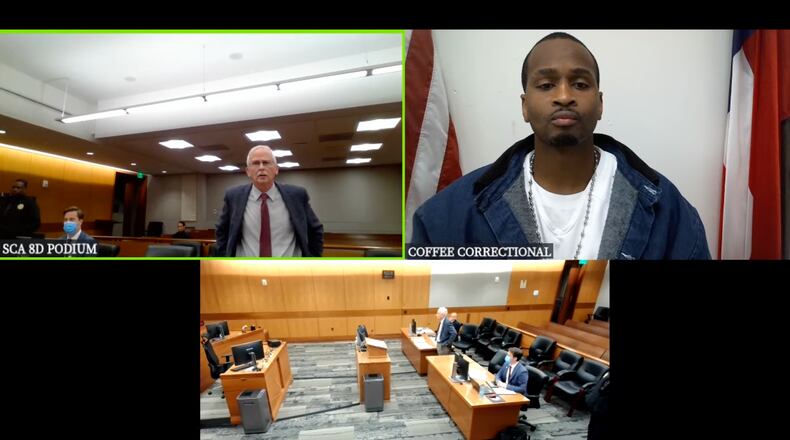The fate of a Georgia defendant whose motion of a new trial was lost for two decades will remain unresolved this year after a December hearing failed to wrap up within the allotted time for all witnesses to be cross-examined.
The case is one of two significantly delayed post-conviction cases that Fulton County Superior Court Judge Robert McBurney will oversee in 2025, as another lost 2000s case resurfaced this fall following The Atlanta Journal-Constitution’s coverage of how Leslie Singleton’s case had languished.
In 2001, Singleton, then 17, was convicted of felony murder for his participation in an attempted carjacking gone awry. While he did not pull the trigger, he was tried as an adult and sentenced to life with parole. A court-appointed attorney filed a motion for a new trial three weeks later. But then 22 years passed with no hearing or decision. It wasn’t until McBurney received a July 2023 letter from Singleton that the oversight was discovered and the case was revived.
“It’s a procedural tragedy,” McBurney said in the spring when the AJC wrote about the debacle.
The judge subsequently assigned a new attorney, David Hoort, to the case. In April, Hoort, a former Michigan judge, filed an amended motion for a new trial. The Fulton County District Attorney’s Office responded in June, maintaining that it believes Singleton, who is now 40, received a fair trial and sentence.
Hearings were subsequently held in June, October and December for McBurney to listen to evidence from both sides. But because post-conviction hearings must get slotted into the judge’s already busy schedule, the three sessions were not enough time for all witnesses to take the stand.
“You have been let down by many aspects of the system, as are Sergeant Grigley’s family,” McBurney said to Singleton at the end of the December hearing, referencing the victim, Melvin Grigley, an off-duty Atlanta Police Department sergeant.
“They may have thought there was closure and to no fault of theirs this case is still rattling around,” he said. “Closure eludes those who most need it: The family and loved ones of the deceased and the guy who has been sitting around 20 years waiting to have that day in court to which he is entitled.”
Credit: Leslie Singleton
Credit: Leslie Singleton
While questions of why the case remained unresolved for decades weigh heavily — and were covered extensively in the AJC’s original investigation — the bigger question now is if it is even possible to undo such a wrong.
With so much time passing, the case has unusual obstacles. Files are missing, memories are less reliable and some of the key players in the case have died.
The latter is a particular challenge, as one of Hoort’s claims is that Singleton received ineffective counsel from his attorney Gary Guichard, who was repeatedly flagged by the state Supreme Court for failures in representing indigent defendants. In a typical claim of ineffective counsel, the trial attorney is called to the stand and given the chance to respond to allegations and explain their legal strategy.
Guichard, however, died in 2014.
Without Guichard or his files, Hoort has attempted to raise doubts about Guichard’s strategies and practices with Singleton by pointing to his other cases. This brushstroke look at an attorney, however, is not typically allowed in a motion for a new trial, which is supposed to focus just on issues within the case at hand. Hoort, for example, was told he could not discuss Michael Lewis, a teenager sentenced as an adult in an unrelated case back in 1997 who was also represented by Guichard. An AJC article on Lewis’ release in November 2023 reported Guichard’s co-counsel subsequently testified that the attorney had provided ineffective counsel.
At the December hearing, Susan Wardell, an attorney who had shadowed Guichard at Singleton’s original trial, attempted to color in some of the details from the trial period.
Wardell testified that Guichard was prone to dozing off at trials, but she said she could not say for certain if that happened in the teen’s case.
Later, when being cross-examined by the state, she answered a question with a statement that cut to the heart of the case’s challenges: too much time passed.
“My memory from 23 years ago is not so great, I am 78 years old,” she said.
As to why the newly resuscitated motion for a new trial process has taken nearly half a year, McBurney points to a number of factors such as the complexity of the case, the need for expert witnesses and a busy court schedule.
“Open, untried cases — in which defendants are in custody without any finding of guilt — typically take priority over appellate matters, which involve defendants already adjudicated guilty,” he wrote in an email to the AJC.
Credit: AJC archive
Credit: AJC archive
The judge does not know when the next hearing will be scheduled but anticipates it will be in the early part of 2025.
At the next hearing Singleton is expected to take the stand for the first time, which will be the conclusion of Hoort’s called-witnesses. The state has not confirmed whether or not it would then call its own witnesses to the stand.
McBurney will then make a decision.
In Georgia, defendants are offered the opportunity for a second review of their case in the form of a motion for a new trial and/or an appeal. If a motion for a new trial is filed, however, a defendant cannot move to the appellate phase until a judge rules. With Singleton’s motion for a new trial never progressing, Singleton had been stuck in legal purgatory.
If McBurney ultimately denies the motion, Hoort can appeal to the Georgia Supreme Court, whose decision would close the loop on this two-decade question mark and could open the door for the actual appellate process.
In previous conversations McBurney has been quick to underscore that Singleton has not been sitting for two decades in jail awaiting his trial.
“He got 98% of his due process: a lawyer, a trial, a jury, a conviction,” said McBurney.
Defense attorneys and advocates are less convinced of the judge’s calculus.
“It’s not really 98% of due process if you didn’t get effective counsel in the first place, is it?” said Andrew Fleischman, a Georgia trial and appellate lawyer.
Post-conviction reviews are meant to guarantee a second set of eyes, he said, explaining they are a fact check and an acknowledgment that systems are made up of people, and people can make mistakes.
The issue of post-conviction delays and oversight is one the Georgia Supreme Court has already attempted to rectify. In 2019, after the justices heard an appellate case from 1997, the high court passed a number of new monitoring rules.
Trial courts now must schedule status conferences regarding motions for a new trial within 120 days of sentencing, and local superior courts must submit biannual logs of all pending motions for new trials or cases awaiting transmission for an appeal.
Credit: Courtesy of Singleton family; Georgia Department of Corrections
Credit: Courtesy of Singleton family; Georgia Department of Corrections
The submitted data is accessible on the state Supreme Court’s website and is reviewed “periodically by a range of members of the judicial branch to ensure compliance with the timeliness of reporting,” Chief Justice Michael Boggs wrote in an email to the AJC this spring.
“These reports were not intended to guide or instigate discipline, but rather were intended to bring public transparency to the issue of delays and to help guide judicial education efforts aimed at reducing the delays,” he wrote.
A review by the AJC, however, raised questions about the impact of such reports.
According to the Winter 2024 report supplied to the court by Fulton County Superior Court, there are more than 350 cases on the county’s list. Of those, roughly 20% are from cases that started a decade or more ago.
Notably, Singleton was not on the list. He was added to the county’s summer report after the AJC pointed out the absence.
“It is regrettable that this has happened again"
The omission underscored the possibility that there could be others waiting in judicial limbo, a fact confirmed this fall.
After the first Singleton hearing in June, McBurney received a letter from yet another defendant — Robert Ponder — who said his motion for a new trial was also lost for two decades.
According to the court docket, Ponder was sentenced in Fulton County Superior Court in 2004 on a murder conviction and the same post-conviction attorney who dropped the ball with Singleton was assigned the case in 2005. The court file shows an entry of appearance in May and June of that year, and then nothing else.
Ponder’s name is missing from Fulton County’s Winter and Summer 2024 Post-Conviction reports.
“It is regrettable that this has happened again,” McBurney told the AJC.
The judge has assigned Ponder to an appellate defense attorney, who will now review the original court transcripts and file an amended motion for a new trial. As with Singleton, Ponder’s post-conviction defense expenses will be shouldered by the county, as the state’s current indigent defense program didn’t exist when either cases were initiated.
About the Author
Keep Reading
The Latest
Featured





